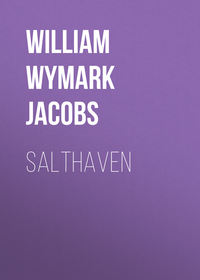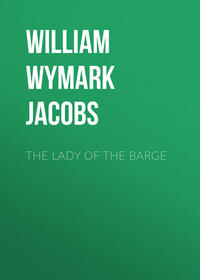 полная версия
полная версияAt Sunwich Port, Complete
“Wot’ll be the end of it I don’t know,” said Mr. Wilks, laying a hand, which still trembled, on the other’ knee. “It’s got about that she saved my life by ‘er careful nussing, and the way she shakes ‘er ‘ead at me for risking my valuable life, as she calls it, going up to London, gives me the shivers.”
“Nonsense,” said Hardy; “she can’t marry you against your will. Just be distantly civil to her.”
“‘Ow can you be distantly civil when she lives just opposite?” inquired the steward, querulously. “She sent Teddy over at ten o’clock last night to rub my chest with a bottle o’ liniment, and it’s no good me saying I’m all right when she’s been spending eighteen-pence o’ good money over the stuff.”
“She can’t marry you unless you ask her,” said the comforter.
Mr. Wilks shook his head. “People in the alley are beginning to talk,” he said, dolefully. “Just as I came in this afternoon old George Lee screwed up one eye at two or three women wot was gossiping near, and when I asked ‘im wot ‘e’d got to wink about he said that a bit o’ wedding-cake ‘ad blowed in his eye as I passed. It sent them silly creeturs into fits a’most.”
“They’ll soon get tired of it,” said Hardy.
Mr. Wilks, still gloomy, ventured to doubt it, but cheered up and became almost bright when his visitor announced his intention of trying to smooth over matters for him at Equator Lodge. He became quite voluble in his defence, and attached much importance to the fact that he had nursed Miss Nugent when she was in long clothes and had taught her to whistle like an angel at the age of five.
“I’ve felt being cut adrift by her more than anything,” he said, brokenly. “Nine-an’-twenty years I sailed with the cap’n and served ‘im faithful, and this is my reward.”
Hardy pleaded his case next day. Miss Nugent was alone when he called, and, moved by the vivid picture he drew of the old man’s loneliness, accorded her full forgiveness, and decided to pay him a visit at once. The fact that Hardy had not been in the house five minutes she appeared to have overlooked.
“I’ll go upstairs and put my hat and jacket on and go now,” she said, brightly.
“That’s very kind of you,” said Hardy. His voice expressed admiring gratitude; but he made no sign of leaving his seat.
“You don’t mind?” said Miss Nugent, pausing in front of him and slightly extending her hand.
“Not in the least,” was the reply; “but I want to see Wilks myself. Perhaps you’ll let me walk down with you?”
The request was so unexpected that the girl had no refusal ready. She hesitated and was lost. Finally, she expressed a fear that she might keep him waiting too long while she got ready—a fear which he politely declined to consider.
“Well, we’ll see,” said the marvelling Miss Nugent to herself as she went slowly upstairs. “He’s got impudence enough for forty.”
She commenced her preparations for seeing Mr. Wilks by wrapping a shawl round her shoulders and reclining in an easy-chair with a novel. It was a good story, but the room was very cold, and even the pleasure of snubbing an intrusive young man did not make amends for the lack of warmth. She read and shivered for an hour, and then with chilled fingers lit the gas and proceeded to array herself for the journey.
Her temper was not improved by seeing Mr. Hardy sitting in the dark over a good fire when she got downstairs.
“I’m afraid I’ve kept you waiting,” she said, crisply.
“Not at all,” said Hardy. “I’ve been very comfortable.”
Miss Nugent repressed a shiver and, crossing to the fire, thoughtlessly extended her fingers over the blaze.
“I’m afraid you’re cold,” said Hardy.
The girl looked round sharply. His face, or as much of it as she could see in the firelight, bore a look of honest concern somewhat at variance with the quality of his voice. If it had not been for the absurdity of altering her plans on his account she would have postponed her visit to the steward until another day.
The walk to Fullalove Alley was all too short for Jem Hardy. Miss Nugent stepped along with the air of a martyr anxious to get to the stake and have it over, and she answered in monosyllables when her companion pointed out the beauties of the night.
A bitter east wind blew up the road and set her yearning for the joys of Mr. Wilks’s best room. “It’s very cold,” she said, shivering.
Hardy assented, and reluctantly quickened his pace to keep step with hers. Miss Nugent with her chin sunk in a fur boa looked neither to the right nor the left, and turning briskly into the alley, turned the handle of Mr. Wilks’s door and walked in, leaving her companion to follow.
The steward, who was smoking a long pipe over the fire, looked round in alarm. Then his expression changed, and he rose and stammered out a welcome. Two minutes later Miss Nugent, enthroned in the best chair with her toes on the fender, gave her faithful subject a free pardon and full permission to make hot coffee.
“And don’t you ever try and deceive me again, Sam,” she said, as she sipped the comforting beverage.
“No, miss,” said the steward, humbly. “I’ve ‘ad a lesson. I’ll never try and Shanghai anybody else agin as long as I live.”
After this virtuous sentiment he sat and smoked placidly, with occasional curious glances divided between his two visitors. An idle and ridiculous idea, which occurred to him in connection with them, was dismissed at once as too preposterous for a sensible steward to entertain.
“Mrs. Kingdom well?” he inquired.
“Quite well,” said the girl. “If you take me home, Sam, you shall see her, and be forgiven by her, too.”
“Thankee, miss,” said the gratified steward.
“And what about your foot, Wilks?” said Hardy, somewhat taken aback by this arrangement.
“Foot, sir?” said the unconscious Mr. Wilks; “wot foot?”
“Why, the bad one,” said Hardy, with a significant glance.
“Ho, that one?” said Mr. Wilks, beating time and waiting further revelations.
“Do you think you ought to use it much?” inquired Hardy.
Mr. Wilks looked at it, or, to be more exact, looked at both of them, and smiled weakly. His previous idea recurred to him with renewed force now, and several things in the young man’s behaviour, hitherto disregarded, became suddenly charged with significance. Miss Nugent looked on with an air of cynical interest.
“Better not run any risk,” said Hardy, gravely. “I shall be very pleased to see Miss Nugent home, if she will allow me.”
“What is the matter with it?” inquired Miss Nugent, looking him full in the face.
Hardy hesitated. Diplomacy, he told himself, was one thing; lying another. He passed the question on to the rather badly used Mr. Wilks.
“Matter with it?” repeated that gentleman, glaring at him reproachfully. “It’s got shootin’ pains right up it. I suppose it was walking miles and miles every day in London, looking for the cap’n, was too much for it.”
“Is it too bad for you to take me home, Sam?” inquired Miss Nugent, softly.
The perturbed Mr. Wilks looked from one to the other. As a sportsman his sympathies were with Hardy, but his duty lay with the girl.
“I’ll do my best, miss,” he said; and got up and limped, very well indeed for a first attempt, round the room.
Then Miss Nugent did a thing which was a puzzle to herself for some time afterwards. Having won the victory she deliberately threw away the fruits of it, and declining to allow the steward to run any risks, accepted Hardy’s escort home. Mr. Wilks watched them from the door, and with his head in a whirl caused by the night’s proceedings mixed himself a stiff glass of grog to set it right, and drank to the health of both of them.
The wind had abated somewhat in violence as they walked home, and, moreover, they had their backs to it. The walk was slower and more enjoyable in many respects than the walk out. In an unusually soft mood she replied to his remarks and stole little critical glances up at him. When they reached the house she stood a little while at the gate gazing at the starry sky and listening to the crash of the sea on the beach.
“It is a fine night,” she said, as she shook hands.
“The best I have ever known,” said Hardy. “Good-bye.”
CHAPTER XVII
The weeks passed all too quickly for James Hardy. He saw Kate Nugent at her own home; met her, thanks to the able and hearty assistance of Mr. Wilks, at Fullalove Alley, and on several occasions had the agreeable task of escorting her back home.
He cabled to his father for news of the illustrious stowaway immediately the Conqueror was notified as having reached Port Elizabeth. The reply—“Left ship”—confirmed his worst fears, but he cheerfully accepted Mrs. Kingdom’s view that the captain, in order to relieve the natural anxiety of his family, had secured a passage on the first vessel homeward bound.
Captain Hardy was the first to reach home. In the early hours of a fine April morning the Conqueror steamed slowly into Sunwich Harbour, and in a very short time the town was revelling in a description of Captain Nugent’s first voyage before the mast from lips which were never tired of repeating it. Down by the waterside Mr. Nathan Smith found that he had suddenly attained the rank of a popular hero, and his modesty took alarm at the publicity afforded to his action. It was extremely distasteful to a man who ran a quiet business on old-fashioned lines and disbelieved in advertisement. He lost three lodgers the same day.
Jem Hardy was one of the few people in Sunwich for whom the joke had no charms, and he betrayed such an utter lack of sympathy with his father’s recital that the latter accused him at last of wanting a sense of humour.
“I don’t see anything amusing in it,” said his son, stiffly.
Captain Hardy recapitulated one or two choice points, and was even at some pains to explain them.
“I can’t see any fun in it,” repeated his son. “Your behaviour seems to me to have been deplorable.”
“What?” shouted the captain, hardly able to believe his ears.
“Captain Nugent was your guest,” pursued the other; “he got on your ship by accident, and he should have been treated decently as a saloon passenger.”
“And been apologized to for coming on board, I suppose?” suggested the captain.
“It wouldn’t have been amiss,” was the reply.
The captain leaned back in his chair and regarded him thoughtfully. “I can’t think what’s the matter with you, Jem,” he said.
“Ordinary decent ideas, that’s all,” said his son, scathingly.
“There’s something more in it than that,” said the other, positively. “I don’t like to see this love-your-enemy business with you, Jem; it ain’t natural to you. Has your health been all right while I’ve been away?”
“Of course it has,” said his son, curtly. “If you didn’t want Captain Nugent aboard with you why didn’t you put him ashore? It wouldn’t have delayed you long. Think of the worry and anxiety you’ve caused poor Mrs. Kingdom.”
“A holiday for her,” growled the captain.
“It has affected her health,” continued his son; “and besides, think of his daughter. She’s a high-spirited girl, and all Sunwich is laughing over her father’s mishap.”
“Nugent fell into his own trap,” exclaimed the captain, impatiently. “And it won’t do that girl of his any harm to be taken down a peg or two. Do her good. Knock some of the nonsense out of her.”
“That’s not the way to speak of a lady,” said Jem, hotly.
The offended captain regarded him somewhat sourly; then his face changed, and he got up from his chair and stood before his son with consternation depicted on every feature.
“You don’t mean to tell me,” he said, slowly; “you don’t mean to tell me that you’re thinking anything of Kate Nugent?”
“Why not?” demanded the other, defiantly; “why shouldn’t I?”
Captain Hardy, whistling softly, made no reply, but still stood eyeing him.
“I thought there was some other reason for your consideration besides ‘ordinary decent ideas,’” he said, at last. “When did it come on? How long have you had it?”
Mr. Hardy, jun., in a studiously unfilial speech, intimated that these pleasantries were not to his taste.
“No, of course not,” said the captain, resuming his seat. “Well, I’m sorry if it’s serious, Jem, but I never dreamt you had any ideas in that quarter. If I had I’d have given old Nugent the best bunk on the ship and sung him to sleep myself. Has she given you any encouragement?”
“Don’t know,” said Jem, who found the conversation awkward.
“Extraordinary thing,” said the captain, shaking his head, “extraordinary. Like a play.”
“Play?” said his son, sharply.
“Play,” repeated his father, firmly. “What is the name of it? I saw it once at Newcastle. The lovers take poison and die across each other’s chests because their people won’t let ‘em marry. And that reminds me. I saw some phosphor-paste in the kitchen, Jem. Whose is it?”
“I’m glad to be the means of affording you amusement,” said Jem, grinding his teeth.
Captain Hardy regarded him affectionately. “Go easy, my lad,” he said, equably; “go easy. If I’d known it before, things would have been different; as I didn’t, we must make the best of it. She’s a pretty girl, and a good one, too, for all her airs, but I’m afraid she’s too fond of her father to overlook this.”
“That’s where you’ve made such a mess of things,” broke in his son. “Why on earth you two old men couldn’t—”
“Easy,” said the startled captain. “When you are in the early fifties, my lad, your ideas about age will be more accurate. Besides, Nugent is seven or eight years older than I am.”
“What became of him?” inquired Jem.
“He was off the moment we berthed,” said his father, suppressing a smile. “I don’t mean that he bolted—he’d got enough starch left in him not to do that—but he didn’t trespass on our hospitality a moment longer than was necessary. I heard that he got a passage home on the Columbus. He knew the master. She sailed some time before us for London. I thought he’d have been home by this.”
It was not until two days later, however, that the gossip in Sunwich received a pleasant fillip by the arrival of the injured captain. He came down from London by the midday train, and, disdaining the privacy of a cab, prepared to run the gauntlet of his fellow-townsmen.
A weaker man would have made a detour, but he held a direct course, and with a curt nod to acquaintances who would have stopped him walked swiftly in the direction of home. Tradesmen ran to their shop-doors to see him, and smoking amphibians lounging at street corners broke out into sunny smiles as he passed. He met these annoyances with a set face and a cold eye, but his views concerning children were not improved by the crowd of small creatures which fluttered along the road ahead of him and, hopeful of developments, clustered round the gate as he passed in.
It is the pride and privilege of most returned wanderers to hold forth at great length concerning their adventures, but Captain Nugent was commendably brief. At first he could hardly be induced to speak of them at all, but the necessity of contradicting stories which Bella had gleaned for Mrs. Kingdom from friends in town proved too strong for him. He ground his teeth with suppressed fury as he listened to some of them. The truth was bad enough, and his daughter, sitting by his side with her hand in his, was trembling with indignation.
“Poor father,” she said, tenderly; “what a time you must have had.” “It won’t bear thinking of,” said Mrs. Kingdom, not to be outdone in sympathy.
“Well, don’t think of it,” said the captain, shortly.
Mrs. Kingdom sighed as though to indicate that her feelings were not to be suppressed in that simple fashion.
“The anxiety has been very great,” she said, shaking her head, “but everybody’s been very kind. I’m sure all our friends have been most sympathetic. I couldn’t go outside the house without somebody stopping me and asking whether there was any news of you. I’d no idea you were so popular; even the milkman–”
“I’d like some tea,” interrupted the captain, roughly; “that is, when you have finished your very interesting information.”
Mrs. Kingdom pursed her lips together to suppress the words she was afraid to utter, and rang the bell.
“Your master would like some tea,” she said, primly, as Bella appeared. “He has had a long journey.” The captain started and eyed her fiercely; Mrs. Kingdom, her good temper quite restored by this little retort, folded her hands in her lap and gazed at him with renewed sympathy.
“We all missed you very much,” said Kate, softly. “But we had no fears once we knew that you were at sea.”
“And I suppose some of the sailors were kind to you?” suggested the unfortunate Mrs. Kingdom. “They are rough fellows, but I suppose some of them have got their hearts in the right place. I daresay they were sorry to see you in such a position.”
The captain’s reply was of a nature known to Mrs. Kingdom and her circle as “snapping one’s head off.” He drew his chair to the table as Bella brought in the tray and, accepting a cup of tea, began to discuss with his daughter the events which had transpired in his absence.
“There is no news,” interposed Mrs. Kingdom, during an interval. “Mr. Hall’s aunt died the other day.”
“Never heard of her,” said the captain. “Neither had I, till then,” said his sister. “What a lot of people there are one never hears of, John.” The captain stared at her offensively and went on with his meal. A long silence ensued.
“I suppose you didn’t get to hear of the cable that was sent?” said Mrs. Kingdom, making another effort to arouse interest.
“What cable?” inquired her brother.
“The one Mr. Hardy sent to his father about you,” replied Mrs. Kingdom.
The captain pushed his chair back and stared her full in the face. “What do you mean?” he demanded.
His sister explained.
“Do you mean to tell me that you’ve been speaking to young Hardy?” exclaimed the captain.
“I could hardly help doing so, when he came here,” returned his sister, with dignity. “He has been very anxious about you.”
Captain Nugent rose and strode up and down the room. Then he stopped and glanced sharply at his daughter.
“Were you here when he called?” he demanded.
“Yes,” was the reply.
“And you—you spoke to him?” roared the captain.
“I had to be civil,” said Miss Nugent, calmly; “I’m not a sea-captain.”
Her father walked up and down the room again. Mrs. Kingdom, terrified at the storm she had evoked, gazed helplessly at her niece.
“What did he come here for?” said the captain.
Miss Nugent glanced down at her plate. “I can’t imagine,” she said, demurely. “The first time he came to tell us what had become of you.”
The captain stopped in his walk and eyed her sternly. “I am very fortunate in my children,” he said, slowly. “One is engaged to marry the daughter of the shadiest rascal in Sunwich, and the other—”
“And the other?” said his daughter, proudly, as he paused.
“The other,” said the captain, as he came round the table and put his hand on her shoulder, “is my dear and obedient daughter.”
“Yes,” said Miss Nugent; “but that isn’t what you were going to say. You need not worry about me; I shall not do anything that would displease you.”
CHAPTER XVIII
With a view to avoiding the awkwardness of a chance meeting with any member of the Nugent family Hardy took the sea road on his way to the office the morning after the captain’s return. Common sense told him to leave matters for the present to the healing hand of Time, and to cultivate habits of self-effacement by no means agreeable to one of his temperament.
Despite himself his spirits rose as he walked. It was an ideal spring morning, cool and sunny. The short turf by the side of the road was fragrant under his heel, and a light wind stirred the blueness of the sea. On the beach below two grizzled men of restful habit were endeavouring to make an old boat waterproof with red and green paint.
A long figure approaching slowly from the opposite direction broke into a pleasant smile as he drew near and quickened his pace to meet him.
“You’re out early,” said Hardy, as the old man stopped and turned with him.
“‘Ave to be, sir,” said Mr. Wilks, darkly; “out early and ‘ome late, and more often than not getting my dinner out. That’s my life nowadays.”
“Can’t you let her see that her attentions are undesirable?” inquired Hardy, gravely.
“I can’t be rude to a woman,” said the steward, with a melancholy smile; “if I could, my life would ha’ been very different. She’s always stepping across to ask my advice about Teddy, or something o’ that sort. All last week she kept borrowing my frying-pan, so at last by way of letting ‘er see I didn’t like it I went out and bought ‘er one for herself. What’s the result? Instead o’ being offended she went out and bought me a couple o’ neck-ties. When I didn’t wear ‘em she pretended it was because I didn’t like the colour, and she went and bought two more. I’m wearing one now.”
He shook his head ruefully, and Hardy glanced at a tie which would have paled the glories of a rainbow. For some time they walked along in silence.
“I’m going to pay my respects to Cap’n Nugent this afternoon,” said Mr. Wilks, suddenly.
“Ah,” said the other.
“I knew what it ‘ud be with them two on the same ship,” continued Mr. Wilks. “I didn’t say nothing when you was talking to Miss Kate, but I knew well enough.”
“Ah,” said Hardy again. There was no mistaking the significance of the steward’s remarks, and he found them somewhat galling. It was all very well to make use of his humble friend, but he had no desire to discuss his matrimonial projects with him.
“It’s a great pity,” pursued the unconscious Mr. Wilks, “just as everything seemed to be going on smoothly; but while there’s life there’s ‘ope.”
“That’s a smart barge over there,” said Hardy, pointing it out.
Mr. Wilks nodded. “I shall keep my eyes open this afternoon,” he said reassuringly. “And if I get a chance of putting in a word it’ll be put in. Twenty-nine years I sailed with the cap’n, and if there’s anybody knows his weak spots it’s me.”
He stopped as they reached the town and said “good-bye.” He pressed the young man’s hand sympathetically, and a wink of intense artfulness gave point to his last remark.
“There’s always Sam Wilks’s cottage,” he said, in a husky whisper; “and if two of ‘is friends should ‘appen to meet there, who’d be the wiser?”
He gazed benevolently after the young man’s retreating figure and continued his stroll, his own troubles partly forgotten in the desire to assist his friends. It would be a notable feat for the humble steward to be the means of bringing the young people together and thereby bringing to an end the feud of a dozen years. He pictured himself eventually as the trusted friend and adviser of both families, and in one daring flight of fancy saw himself hobnobbing with the two captains over pipes and whisky.
Neatly dressed and carrying a small offering of wallflowers, he set out that afternoon to call on his old master, giving, as he walked, the last touches to a little speech of welcome which he had prepared during dinner. It was a happy effort, albeit a trifle laboured, but Captain Nugent’s speech, the inspiration of the moment, gave it no chance.
He started the moment the bowing Mr. Wilks entered the room, his voice rising gradually from low, bitter tones to a hurricane note which Bella. could hear in the kitchen without even leaving her chair. Mr. Wilks stood dazed and speechless before him, holding the wallflowers in one hand and his cap in the other. In this attitude he listened to a description of his character drawn with the loving skill of an artist whose whole heart was in his work, and who seemed never tired of filling in details.
“If you ever have the hardihood to come to my house again,” he concluded, “I’ll break every bone in your misshapen body. Get!”
Mr. Wilks turned and groped his way to the door. Then he went a little way back with some idea of defending himself, but the door of the room was slammed in his face. He walked slowly down the path to the road and stood there for some time in helpless bewilderment. In all his sixty years of life his feelings had never been so outraged. His cap was still in his hand, and, with a helpless gesture, he put it on and scattered his floral offering in the road. Then he made a bee-line for the Two Schooners.









